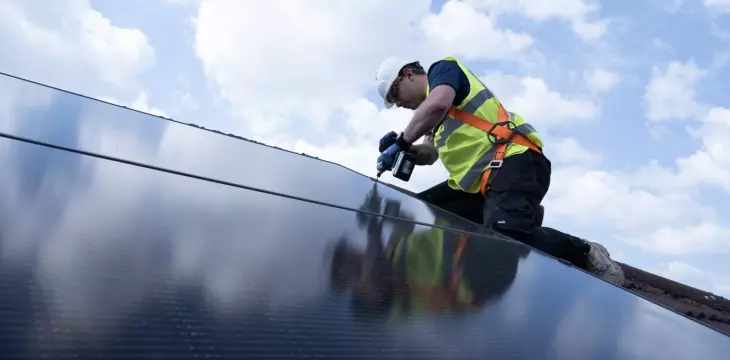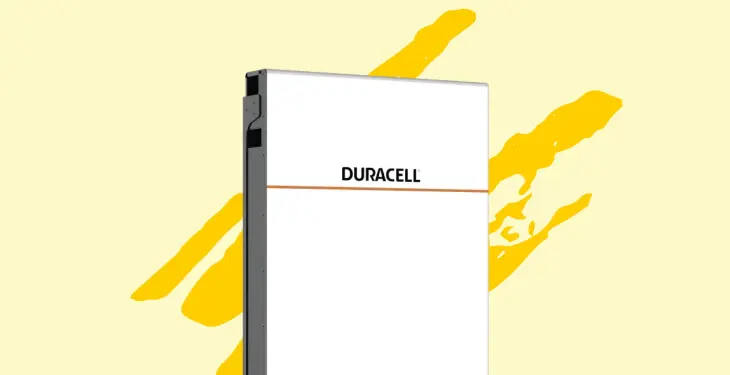

Written by Bethany Armstrong
Renewables Manager
Updated: 20th October, 2025
The focus is on specific types of properties that are ideal for solar panels and those that are not, assessing aspects such as roof compatibility, exposure to sunlight, and potential for energy savings.
See how much you could save with a solar & battery quote.
Determining whether solar panels are a suitable investment for your property hinges on multiple factors such as location, roof orientation, and energy consumption habits.
Solar power presents a renewable energy option that can lead to substantial savings on your electricity bills and a reduction in carbon footprint.
However, the initial cost of solar panel installation is significant and should be weighed against long-term benefits.
In some cases, homeowners have the option to use a hybrid system, incorporating both a gas boiler and solar panels to maximise energy efficiency. This approach provides the flexibility of solar power when conditions permit and the reliability of gas heating when needed.
Solar panels harness solar energy to produce electricity. They consist of photovoltaic (PV) cells for electricity generation and can also take the form of solar thermal panels for heating purposes.
Solar PV panels contain several cells made of silicon. These cells are semiconductors, which become energised when exposed to sunlight, creating an electric field.
As photons - particles of light , strike silicon cells, electrons are knocked loose, and this movement generates an electric current.
The panels are often paired with an inverter to convert the direct current (DC) electricity produced to alternating current (AC), which can be used in the home or fed into the national grid.
Components of a Solar PV Panel:
Silicon Cells: The active element that converts light into electricity.
Inverter: It converts DC to AC electricity.
Wiring: Conducts the electricity.
Mounting: Secures the panels on the roof or ground.
Advantages
Renewable: Solar panels capitalise on solar energy, an abundant and renewable source.
Cost-saving: They can lead to significant electricity bill reductions over time.
Low Maintenance: Solar panels require minimal maintenance once installed.
Sustainable: They provide a way to reduce one's carbon footprint by using clean energy.
Disadvantages:
Initial Investment: The upfront cost for installation can be high.
Weather Dependent: Their efficiency can be compromised on cloudy or rainy days.
Space Consumption: Adequate roof space is essential; not all roofs are suitable due to angle, orientation, or strength.
Solar thermal panels, unlike PV panels, contain a heat-absorbent material; these panels use sunlight to heat water or antifreeze in a closed-loop system.
This system is particularly beneficial for heating water in residential or commercial properties.
However, solar thermal panels are less prevalent than PV systems due to their more specific use-case.
Determining whether a property is apt for solar panel installation pivots on several architectural and geographical nuances.
In this section, the focus is on specific types of properties that are ideal for solar panels and those that are not, assessing aspects such as roof compatibility, exposure to sunlight, and potential for energy savings.
Properties with unobstructed exposure to sunlight, especially those with south-facing roofs, are prime candidates for solar PV systems. This orientation maximises the capture of solar energy. Optimal roof conditions are as follows:
Inclination: A pitched roof with an angle of about 30 to 40 degrees to the horizontal.
Structure: The roof must be sturdy enough to support the weight of panels and associated equipment.
Material: Tiles or metals are typically conducive to installation.
Space: Adequate roof area without shade from trees or nearby buildings.
Such homes could witness a substantial reduction in electricity bills, as the solar panels provide free renewable energy during daylight hours.
Moreover, excess renewable electricity can be sold back to the grid through Smart Export Guarantee schemes, bolstering financial returns. It's important to note that the solar PV system's efficiency is contingent on the inclusion of a proficient inverter and that running costs are generally low due to limited maintenance requirements.
Conversely, several factors may deem a property unsuitable for solar energy harnessing:
Orientation and Shading: North-facing roofs in the Northern Hemisphere receive less sunlight. Properties overwhelmed by shade from other buildings or dense foliage will also underperform.
Roof Condition: Weak or damaged roofs that cannot withstand the weight of solar panels without significant repair.
Planning Restrictions: Listed buildings or homes in conservation areas may face constraints on alterations.
Temporary Residency: For those not planning long-term residence in their current home, the initial investment might not yield a timely return.
If these conditions are present, homeowners may find their property ill-suited for a solar panel installation. In such scenarios, investing in alternative energy efficiency measures or heating systems, such as a new gas boiler, might offer a more viable solution for reducing energy bills. It's essential for property owners to carefully evaluate these considerations before proceeding with a solar panel installation.
Solar panel investment is an initial expenditure that should be weighed against long-term potential savings. It's not merely a purchase; it's an investment in a greener future and potentially lower energy expenses.
The initial cost of a solar PV (photovoltaic) system primarily consists of the price of the panels themselves and the inverter, which is critical for converting solar power into usable electricity. The average cost of a 3.5kWp solar PV system hovers around £7,000.
Factors influencing this cost include the quality of the panels, the complexity of the installation, and additional components, such as the efficiency of the inverter.
Most installations will also require the services of a certified electrician, which adds to the overall cost.
A detailed breakdown might look something like this-
Solar PV Panels: £4,500 - £6,000
Inverter: £1,000 - £1,500
Installation: £500 - £700
Miscellaneous (Scaffolding, etc.): £100 - £300
These prices can be even higher if the property requires structural reinforcement or if specialised products, such as panels designed for roofs with weight restrictions, are chosen.
The long-term savings from solar panels come from the efficiency gains in energy production, allowing homeowners to potentially save on their energy bills. Additionally, excess electricity can sometimes be sold back to their energy company through schemes like the Smart Export Guarantee (SEG). Over their lifetime, solar panels are expected to significantly offset the initial outlay.
Factors influencing long-term savings:
Boiler Efficiency: Solar panels may reduce the need for a gas boiler, particularly if the property's radiators are already efficient.
Electricity Prices: As energy prices rise, savings are likely to increase.
System's Lifespan: Solar PV systems typically last around 25 years.
Maintenance: Low ongoing costs, though occasionally cleaning or an inverter replacement may be required.
It's important to understand that these savings are projections and actual figures will vary based on individual circumstances. A well-maintained system in an optimal location can maximise savings, while poorly sited installations might see less financial benefit.
In properties across the UK, homeowners can indeed pair a traditional gas boiler with solar panels. This combination promotes energy efficiency and cost savings.
Integrating solar panels with a gas boiler operates on a premise of energy diversification. Solar photovoltaic (PV) panels generate electricity that can be used to power the boiler, reducing reliance on the grid. This is especially effective during sunny periods when excess energy is produced. Conversely, when solar output is low, the gas boiler can act as a reliable backup.
Solar thermal panels differ as they directly heat water. These can be connected to a boiler's hot water system, ensuring that water temperature is maintained without excessive gas usage. Efficiency lies in this dual approach; it harnesses renewable solar energy when available, supplementing with gas when necessary. Maintenance for such systems is routine, with an annual service recommended to ensure optimal performance and prevent issues such as a carbon monoxide leak.
Investment in solar panels and a new boiler system is not insignificant, yet the long-term savings on energy bills can be substantial. Initial costs are context-specific, affected by property size, the complexity of installation, and chosen systems' capacities. A new gas boiler can range between £1,500 and £4,764 to install. Solar panel costs vary, and homeowners must also consider the warranty and potential maintenance costs.
Item | Average Cost (GBP) | Additional Considerations |
New Gas Boiler | £1,500 - £4,764 | Annual service required |
Solar Panel System | Varies | Maintenance, warranty |
It must be noted that these figures do not account for possible government incentives or the potential increase in property value due to such eco-friendly upgrades. Over time, reduced utility bills and the use of excess energy to potentially generate income contribute to offsetting the initial expenses.
Last updated: 20th October, 2025

Written by Bethany Armstrong
Renewables Manager at iHeat
Bethany Armstrong is a renewables expert and operations manager at iHeat, specialising in heat pump solutions and solar project delivery across the UK.
LinkedInArticles by Bethany Armstrong are reviewed by iHeat’s technical team to ensure accuracy and reliability.

20th February, 2026
Yes, you can install home battery storage without solar panels in the UK. A battery-only s...
 Read Article
Read Article

19th February, 2026
Your Distribution Network Operator is the regional company that owns and manages the elect...
 Read Article
Read Article

06th January, 2026
These grants not only help residents save money on installation but also help lower energy...
 Read Article
Read Article
No obligation. Takes less than 60 seconds.